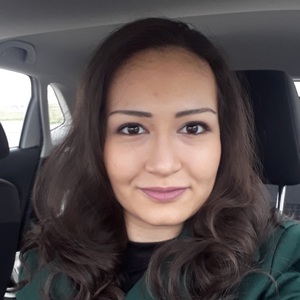Our testimonials: Nazli

Our testimonials: Nazli
Meet Nazli from Türkiye
Student of Italian Medieval and Renaissance Studies
"I really appreciate how much the university is encouraging this spirit of interconnectedness between students because I believe that it creates such a unique and intellectually stimulating atmosphere"

About myself
I am a second-year undergraduate student at UniPd. I study Italian literature and history. I am mainly interested in Petrarch, Renaissance poetry, intellectual history, and history of printing. But what I share with all my colleagues in Italian Medieval and Renaissance Studies programme is a passion for Italy and Italian culture. Apart from my studies, I enjoy exploring the Italian cuisine and other wonderful aspects of the city life in Padua.
Why did you choose the University of Padua and the Italian Medieval and Renaissance Studies degree programme? Why would you recommend it to other students?
The Italian Medieval and Renaissance Studies programme of UniPd is unique in the fact that it allows students to study Italian and European culture with a comprehensive approach that combines literary and historical studies alongside the study of Italian language. I was looking for a programme in English that would allow me to discover more in-depth the intellectual history of western Europe, and this one turned out to be great because you already start studying a wide range of topics in English in your first year while learning the Italian language. Padua is also a very lively university city with a growing number of international students, so you get the chance to experience life in an Italian city while being a part of a rich community of international students. The first thing I noticed when I came to Padua was the that the city is very intertwined with the university, so much that living in Padua feels like living in a huge and lively university campus (but 20 minutes away from Venice and Verona!) and this was one the most important aspects that convinced me to choose to study in Padua instead of any other Italian city. I would highly recommend my degree course to any student wishing to explore European literature, history, and art while learning a new language and living in one the most beautiful cities of Northern Italy. If you are looking for a flexible, lively but also academically rich university experience in humanities, this programme is great for you!
What are the main features of your degree programme?
My degree course is unique as a programme that combines western literary studies with history and art history, with a focus on the Italian peninsula during Medieval Age and Renaissance. Regardless of whether you are more interested in classical culture or modern intellectual history, it allows you to explore both and understand the intellectual foundations of western society. In the first two years, students combine classes from literature, art history and history departments so that they can understand in which area of study they are more interested, and in the third year, they have the chance to design a personal pathway on the basis of their interests. The first year is taught completely in English and the knowledge of Italian language is not mandatory (although I would highly recommend you start familiarising with the language before coming to Padua). All students attend, during the first two years, Italian classes offered by the University Language Centre and department of literary studies in addition to their subject-based classes, and thus, intensive study of the Italian language is an important part of the experience. In the third year, all classes are offered in Italian and students are expected to write their final dissertation in Italian. The second-year programme includes an introduction to the Latin language, and those who are interested can continue learning Latin or study ancient Latin/Greek literature in their third year. Students also attend laboratories and workshops as part of their study plan that give them direct access to on-site experience in archives, libraries, museums, galleries. This allows us to have a more interactive experience as we often have trips and visits to different sites both in and out of Padua.
Is there any class/subject that has stood out to you so far?
For me, the most surprising aspect of doing this degree programme has been seeing how interested I was in literary studies. My favourite classes from both first and second year have been those on Medieval and Renaissance Italian literature. For example, I particularly enjoyed studying Dante and Petrarch and the best part was being able to study the original texts in Italian with the help of our professors who were able to offer us support in English. I enjoyed our literature courses so much that I ended up attending extra classes offered in Italian on similar subjects, and this has helped me a lot to improve my language skills. I owe another totally unexpected discovery about my interests to a laboratory on typography and printing history we had in the second year. The course included a workshop experience in a typography museum, and I was totally fascinated by the process of printing with movable metal types, and now I am very eager to further study the history of printed books in Renaissance. I think many of my friends had similar experiences with many different subjects as we had the chance to take a wide selection of classes on topics ranging from medieval poetry, economic history, theatre, musicology, and art history.
What aspects of our university’s culture or values have resonated with you the most?
The University of Padua offers its students a very rich and flexible learning experience. You can follow as many courses as you want without being restricted by a strict and limited curriculum, and whenever you need support or advice for planning your academic pathway, you have the chance to directly talk to professors who are usually very approachable and encouraging. The university offers a lot of support also through its tutor-body initiatives. Basically, all departments have their students tutors who are usually more experienced master’s/PhD students that offer tutoring and guidance to their younger colleagues on the basis of their personal needs. I really appreciate how much the university is encouraging this spirit of interconnectedness between students of different levels and academics because I believe that it creates such a unique and intellectually stimulating atmosphere.
What do you like most about the City of Padua and why?
University is a huge part of Paduan city life, and although it is a city of considerable size, living in Padua has always given me the feeling of living in an enormous and extremely rich university campus. The locals are very much used to interacting with university students (both Italian and international students I mean) and the city is quite supportive of an active student life with a lot of cultural events being organised all over the year. Another great aspect of living in Padua is being close to other important cities of Northern Italy like Venice, Verona, and Vicenza. This gives you the chance to travel all around the country and explore different environments without having to do complicated logistic arrangements, and I firmly believe that travelling is an indispensable part of student life. A third point which is even more relevant for Italian Medieval and Renaissance Studies programme is Padova’s extremely rich cultural heritage. It is a city full of living history and if you are studying Medieval or Renaissance art and literature, you will be shocked by how central Padova has been in many key events and developments that took place in these periods. For example, I was completely amazed by how we were able to study Giotto’s monumental contribution to art history by personally visiting the world-famous Scrovegni Chapel which is situated at 10 minutes of walking distance from our department, and this is just one example among many hidden marvels Padua has for a student of history!
What do you do when you’re not studying?
In my free time, I enjoy spending time in the city with my friends. There are always several cultural events going on at the same time, so it is not hard at all to find something interesting to do (in fact what is harder is choosing among many different options!) Thanks to being a member of the University community, you get privileges and discounts in accessing many of cities’ museums and cultural centres, so it becomes much easier to take part in the lively cultural life of the city even when you are a student with a tight budget. Apart from this, the university itself has amazing libraries that offer a lot to explore even out of your studies, so I find myself spending a lot of time in libraries. For those interested, there is also a huge sports’ centre just out of the city centre, which offers several activities and courses, so I would say that there is something for everyone’s taste in Padua!
MEET OUR TESTIMONIALS
Many students shared their experiences at the University of Padua.
Find out their stories!


